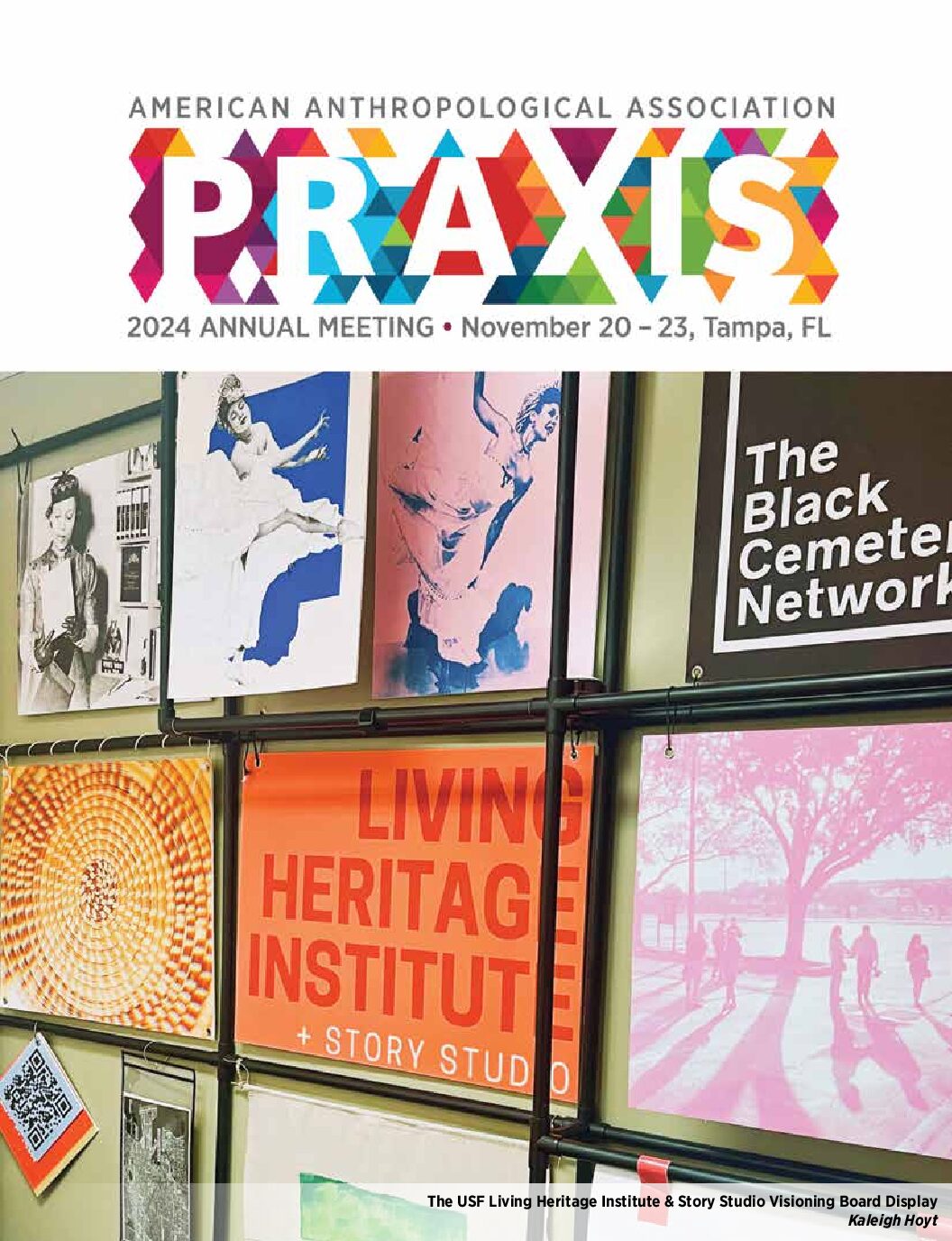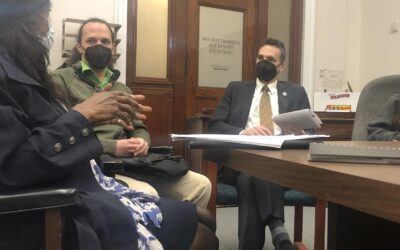Forecasting Policy Trends
The Association for the Anthropology of Policy
Kristina Hook
July 13, 2018
The application of predictive technologies to public policy questions opens opportunities for anthropologists to inject a human-focused approach into policy tools, issues, and processes.
Future prognostications tend to baffle each successive generation, as familiar technologies and approaches branch o in surprising directions. Predicting the future of anthropological policy studies, including its makings, workings, contexts, agents, and effects, is thus akin to tracing an individual wave during a tsunami. Moreover, those of us who study policy find ourselves grappling with inherently political subject matters in an age that blindsided many professional forecasters. As anthropologists, however, we are aided by an essential insight in order to move beyond these uncertainties: policy communities are human communities, and therefore, policies and policy trends should be conceived of as inherently social products.
As I draw from my background to consider current and future policy trends, I suggest that we are living in a moment that is ripe for the application of anthropologically grounded policy perspectives.Serving as a US Department of State policy advisor specializing in mass atrocity prevention and conflict stabilization and later as a diplomat in an embassy abroad, forced me to confront the (often productive) tension of applying anthropology’s humanizing focus to the political and bureaucratic realities of applied work. Yet future trends, including the application of new technologies to public policy questions as well as an increasing sense of what these tools can and cannot do, are creating opportunities for the disciplinary strengths of anthropology to be both recognized and relied on.
Anthropologists of policy derive ethnographically driven, socially focused insights from the creation and implementation of political agendas across a variety of contexts, from the transnational to the local. Similarly, within bureaucratic enterprises, policy advisors pride themselves on guiding their operations-focused counterparts to glance up from the weeds to the stars: from the critically important minutia of implementation to the equally essential strategic vision that drives the initiatives and institutions in the first place. As political actors and social scientists alike continue to navigate the fallout from system-shock events like Brexit and the 2016 US presidential elections,policy audiences are increasingly questioning that which is often taken for granted, creating a window of opportunity for contributions from anthropologists of policy who speak a similar language of big-picture, systems-oriented analysis.
In the foreign policy eld, this particular historical moment of questioning not only opens the door to reconsidering institutional cultures, structures, or goals. Rather, I also sense an increasing appetite for data-driven problematizing and for an anthropological focus on discovering what lies between the cracks of global trends and international dynamics. Over the past decade, new technologies, especially advancements in computing techniques involving “big data,” have evolved.In a 2016 report, IBM estimated that 90 percent of the world’s data had been generated and stored in the previous two years alone, at a rate of 2.5 quintillion bytes of data per day (IBM 2016, 3). The company further estimated that this data growth rate will accelerate even faster in the coming years due to continuing technological advancements. In the past decade, as data was created at unprecedented speeds, new foreign policy ideas regarding predictive analytics emerged alongside these advancements. With each technical breakthrough, faith blossomed that future-oriented order and prognostic patterns could be found among the chaos of unprecedented quantities of raw data.Although the technologies were new, such as the study of warfare through the Senturion or Integrated Crisis Early Warning System (ICEWS) programs, they contributed to an established trend of global horizon scanning that seeks to allocate limited resources effectively by identifying burgeoning risks before they erupt into uncontrollable conflagrations. Other global horizon scanning efforts led by civil society initiatives include the United States Holocaust MemorialMuseum’s Early Warning Project and Genocide Watch’s efforts to monitor growing risks of large-scale violence in real time through a watch/warning/emergency model.
The lure of excessively technocratic approaches is challenging to resist for over-worked policy experts, who are primarily advised by a eld of policy studies that is dominated by overly reductionist models of human behavior developed by some subfields of economics or related disciplines. Moreover, policy advisors are tasked with organizing the chaos of their issue sets into manageable problems, and anthropologists desiring to impact or conduct nuanced research on social policy must be cognizant of this reality. However, events like Brexit and the 2016 US elections—and more importantly, the widely perceived failures of data journalism to catch the trends that precipitated these episodes—has jolted many policy specialists to question overly technocratic approaches that over promise predictions of human behavior or simplify complex social dynamics into rote formulas.
During this time of questioning, as experts consider both the advantages of big data technologies as well as their limitations, anthropology’s disciplinary refusal to avoid complexity and nuance can shine an empirical lantern on such blind spots. While offering clear potential, the promise of big data-driven methodological techniques carries with it certain risks, including that the full portrait of what it means to be human—in all of our cultural, linguistic, and biological complexity—can be lost from this perspective. An exclusively ten-thousand-foot view may be able to spot the rivers below and perhaps even point to some currents, but it may also miss the streams and the tributaries that propel these larger trends.
As we envision future policyscapes and the role anthropologists will play in them, I suggest that current political shockwaves offer an opportunity to influence emerging trends in meaningful ways.Armed with the knowledge that many policy advisors pride themselves on their ability to see the big picture, anthropologists of policy can pitch their research contributions as magnifying this needed systems-and-institutions check. Such a framing is more likely to result in greater institutional access for anthropological researchers, thus allowing anthropologists to also ground policy’s telescoping perspective by humanizing policy processes and offer insight into how systems and institutions operate. For anthropologists who choose to engage with specific policy issues, the deceptively simple challenges of incorporating nuanced insight into policy tools and ingraining a counterintuitive comfort level regarding such complexity into policy mindsets stand to be our most valuable contributions for future-oriented policy work. To effectively engage a policy process, we must aim to make our contributions actionable—not just interesting. To do so, while remaining true to our strengths of nuance and complexity, integrated anthropological approaches across our field’s subfields promise sophisticated methodologies for incorporating gradation—a toolkit that is useful even to big data evangelists. Finally, with reference to our own disciplinary community, policy-oriented anthropologists can likewise fulfill a valuable role by reminding us that the policy community is no more homogenous than any of the other multifaceted and diverse societies that anthropologists study.
Kristina Hook is a doctoral candidate in anthropology and peace studies at the University of Notre Dame. A 2018–2019 Fulbright fellow to Ukraine, Kristina’s research is also supported by the National Science Foundation’s Graduate Research Fellowship Program and a USAID/Notre Dame GlobalDevelopment Fellowship.
A link to this article on the Anthropology News website can be found here.


